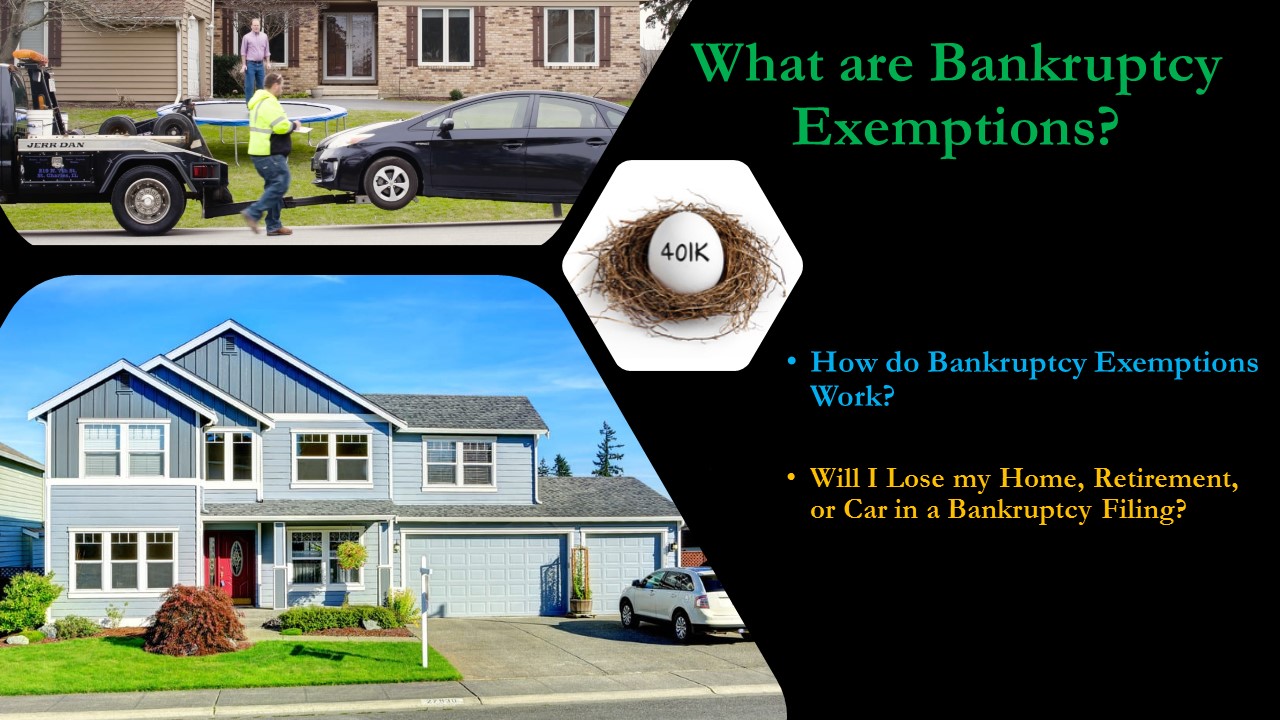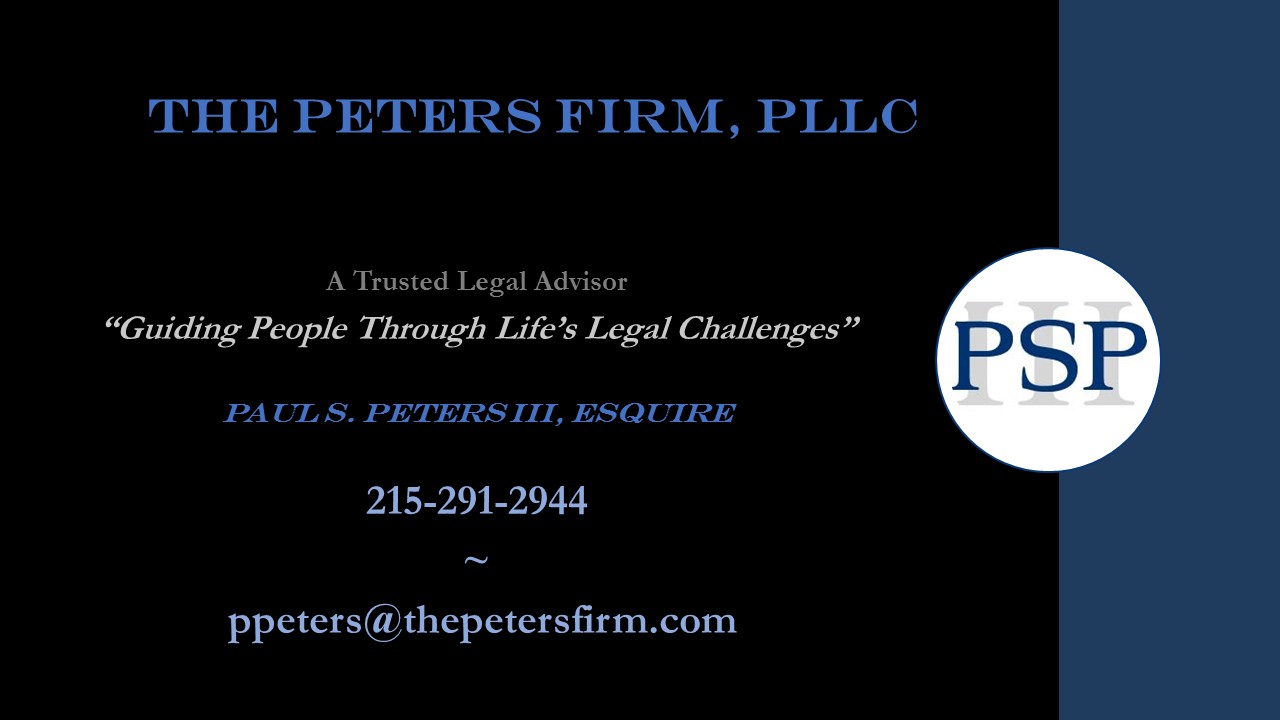
WHAT ARE BANKRUPTCY EXEMPTIONS?
When considering filing a Chapter 7 or Chapter 13 bankruptcy, a common concern among clients is whether they may lose their home, car, retirement accounts, or other assets and property. The federal bankruptcy laws include specific protections for the property and assets of bankruptcy debtors. When a one files Bankruptcy, all his/her property becomes part of the bankruptcy estate and administered by the Trustee appointed to oversee the Bankruptcy. The Trustee reviews and determines if the bankruptcy estate property is all protected or if any property has unprotected value or equity.
Bankruptcy Code Section 11 U.S. Code § 522 establishes the protection rules for a debtor’s property; in the world of Bankruptcy, the term for the protections is Exemptions. What are Bankruptcy Exemptions? How do Bankruptcy Exemptions Work?
What are Bankruptcy Exemptions?
Bankruptcy Exemptions refer to the amount of equity or value debtors are permitted to have in specific types of property or assets. If the property is within the Exemption amount, the property is safe from seizure by the court; if it is over the exemption amount, it may be subject to seizure and sale by the court. Examples of property permitted for exemption are your primary residence, automobiles, furniture, jewelry, and retirement accounts.
How Do Bankruptcy Exemptions Work?
The property in question must first be assigned a fair market value. Next, any debts against the property (mortgage or car loan) get subtracted from the fair market value to determine the equity or net-value of the property. The court will also consider the estimated or customary costs involved in selling the property; if any, they get subtracted from the fair market value. If the equity or net-value of the property falls within the exemption amount, the property is safe from court seizure. In the event, the property’s equity or net-value exceeds the exemption amount, the seizure and sale of the property by the court may be a concern.
What are the Specific Bankruptcy Exemptions?
The Bankruptcy Code designates specific items of real or personal property and assigns a specific dollar amount of net-value or equity the property can have.
It is important to note that if filing as a married couple, the amounts listed below are double.
The Federal Bankruptcy Exemptions are:
Home – $25,150/$50,300
Motor Vehicle – $4,000/$8,000
Clothing, Appliances, Electronics, Home Furnishings, Furniture – $13,400/$26,800
Jewelry – $1,700/$3,400
Health Aids – 100% of value
Wrongful death recovery – 100% of value
Personal injury award – $25,150/$50,300
Lost earnings payments – 100% of value
Retirement Accounts – 100% of value, includes 401(k), 403(b), profit-sharing, and money purchase plans, SEP, SIMPLE IRAs, and defined benefit plans
IRAS and Roth IRAs – $1,362,800
Public Assistance, Social Security, Veteran’s Benefits, Unemployment Compensation – 100% of the value
Crime victim’s compensation – 100% of the value
Tools of Trade – $2,525.00/$5,050
Alimony and Child Support – 100% of the value
Unmatured Life Insurance Policy – 100% of the value
Life insurance policy with loan value – $13,400
Wildcard – $1,325/$2,650 plus the unused portion of home exemption up to $12,575/$25,150, for any property.
What if Property Exceeds the Exemption?
If you have multiple cars or property that exceeds the allowed exemption, you may still have no issues proceeding with a bankruptcy and keeping all your property. For instance, the Wildcard exemption can protect property in cases with multiple cars, large tax refunds, substantial checking or savings account balances, certificates of deposit, or personal injury proceeds.
Even if the property exceeds the exemption amount and the Wildcard exemption is unavailable, you may still be fine proceeding with a bankruptcy. The first step is considering the extent the net-value or equity exceeds the exemption. The Trustee and court will perform a financial analysis to determine if exemption overage is worth the time, effort, and cost to seize and sell the property. For any seizure of property, the Trustee must hire an attorney and then proceed incurring expenses involved in selling the property. If seizing and selling the property will not result in significant proceeds for disbursement to creditors, the Trustee will abandon the property and allow the debtor to keep it.
If you are facing unmanageable Debt and believe Bankruptcy is an option, immediately call the Trusted and Experienced Bankruptcy Lawyer, Paul S. Peters III, Esquire. Do not make assumptions about the threat of losing your property in Bankruptcy. Using his 20 years of experience handling Bankruptcy Matters, including those involving property value issues, Paul S. Peters III, Esquire will guide you through the process of attempting to protect your property while erasing all your Debt. DO NOT WASTE ANOTHER MINUTE!
YOU BETTER CALL PAUL!
215-291-2944
ppeters@thepetersfirm.com
Trusted and Experienced
Pennsylvania Bankruptcy Attorney
If you are considering filing a Chapter 7 or Chapter 13 Bankruptcy, contact the trusted and experienced Montgomery, Philadelphia, Bucks, Delaware, Chester, Lehigh, Lancaster, Northampton, Berks, Adams, Cumberland, Dauphin, Franklin, Fulton, Huntington, Juniata, Lebanon, Mifflin, Perry, Snyder, York Bradford, Cameron, Centre, Clinton, Lycoming, Montour, Northumberland, Potter, Sullivan, Tioga, Union, Carbon, Columbia, Lackawanna, Luzerne, Monroe, Pike, Schuylkill, Susquehanna, Wayne, and Wyoming County Chapter 7 and Chapter 13 Bankruptcy Attorney Paul S. Peters III, Esquire at:
PAUL S. PETERS III, ESQ.
215-291-2944
ppeters@thepetersfirm.com



